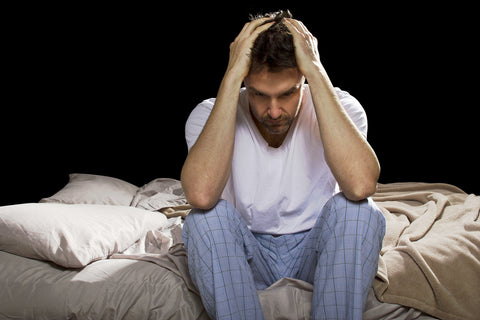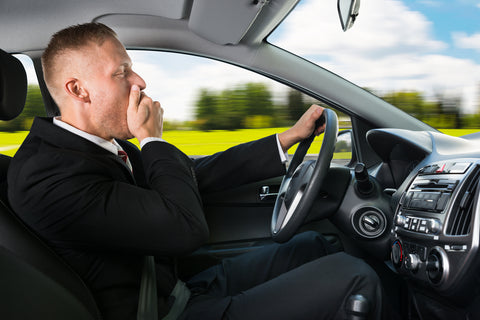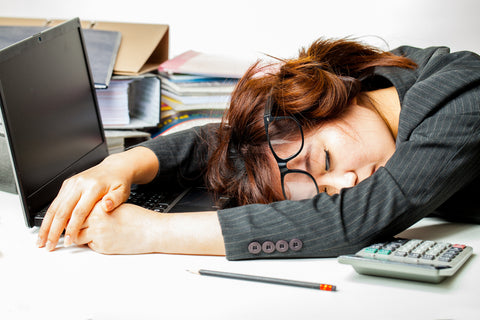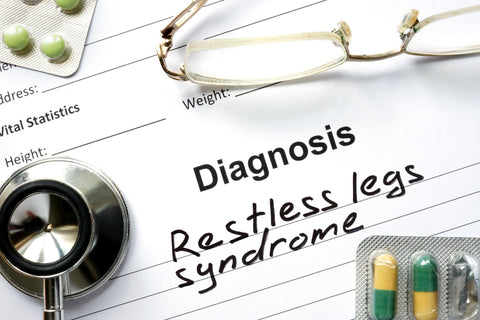Not getting a good night’s sleep can leave you feeling moody or irritable the next day. But what happens if you experience sleep problems for several nights in a row? Being constantly fatigued may not be the only change you notice –– you may also start to feel an impact on your mental health.

Sleep issues may be a sign of a psychotic disorder, such as bipolar disorder. Mental health issues, however, can also lead to or be made worse by poor sleep patterns. Some of the more common mental health disorders that have been linked to sleep include:
When sleep becomes elusive, search out the sleep experts at My CPAP Club. Based in North Carolina, we can ship CPAP machines, water chambers, masks and accessories to patients all over the United States who need help breathing while asleep (and staying asleep).
Take care of a sleep disorder before it impacts your mental health. Lean on My CPAP Club by calling us at 1-888-272-7050 or by filling out our online contact form.

Drowsy driving may seem like it’s something that isn’t that harmless. After all, there aren’t legal ramifications for driving while sleepy like there are for those who are caught drunk driving. What’s more, you may feel like you are able to beat the system, so to speak, by adjusting the temperature in your car or by drinking caffeinated beverages.
The statistics, however, speak otherwise. A study published in the journal “Archives of Internal Medicine” indicates that a person who is driving drowsy is just as likely as a person driving drunk to cause an accident. The study also found that men are more likely to engage in drowsy driving, and that those who are ages 18-29 are also more likely to get behind the wheel while sleepy.
Factors that can contribute to drowsy driving in North Carolina include:
Another factor that can contribute to your drowsy driving is an undiagnosed sleep disorder, such as sleep apnea. Sleep apnea is a medical condition that refers to difficulty breathing while asleep. Sleep apnea can be diagnosed by a physician, who may gather information about your sleeping habits or patterns from a family member.
If they determine that you have sleep apnea, one of the best means you can use to get a good night’s sleep (and end drowsy driving) is through My CPAP Club. My CPAP Club is based in North Carolina, and can ship CPAP machines, water chambers and masks across the country. These devices will help you maintain healthy breathing patterns while you are asleep, leaving you feeling well-rested in the morning.
Don’t become a driving statistic. Turn to My CPAP Club for all of your CPAP machine needs. To get started, contact us online or call us at 1-888-272-7050 today.
We all hit that 2 p.m. wall from time to time –– your coffee wears off or that big lunch kicks in and you’re fighting the urge to nap. Now imagine that feeling all the time, regardless of your caffeine or food intake. Hypersomnia is a condition that results in excessive daytime sleepiness (or EDS). This means that almost regardless of what you are doing, such as working or driving, you may find it nearly impossible to avoid falling asleep.

This won’t just affect your work output. Hypersomnia can also wreak havoc on your critical thinking abilities, as well as your overall energy levels.
Many factors can contribute to hypersomnia, including:
If your doctor has cited sleep apnea as the root cause behind your hypersomnia, My CPAP Club can help. Sleep apnea is a condition that refers to difficulty breathing while you are asleep. This can lead to interruptions in your sleep patterns that you may not even remember, leaving you feeling tired during the day.


Even if you’re tired and ready to go to sleep for the night, your body may not cooperate by showing signs of restless legs syndrome (RLS) or periodic limb movement disorder (PLMD). RLS is a neurological disorder that causes your legs and other limbs to feel the need to move. Some patients describe it as pins and needles, which can be made worse when you are sitting or lying down. Even though it can come and go, RLS is often the most disruptive at night –– and can result in so much sleep deprivation that it starts to drastically impact your quality of life.
On the other hand, PLMD is movement or cramping in your legs while you are asleep. It is referred to as periodic because it generally occurs one to three times every minute. PLMD has been linked to RLS, and has also resulted in the loss of sleep.
It is not known what causes either disorder, although PLMD and RLS have been linked to the following:
If other sleep disorders, such as sleep apnea, are to blame for your PLMD or RLS, My CPAP Club can help. Located in North Carolina, we are able to ship devices all over the country to help you get the good night’s sleep you deserve. We also sell all supporting equipment and accessories, so you won’t have to go through multiple vendors to finally enjoy sleeping through the night.
Ready to sleep for a solid eight hours? Contact My CPAP Club online or check out our FAQ section to learn more about how we can help.
 Getting a full night of sleep when you’re pregnant can be difficult –– especially if your baby is active in the evening. One of the problems that can contribute to your lack of sleep is a condition called obstructive sleep apnea. While many people think it only affects men, women can struggle with it as well. It can be detrimental to productive sleep patterns on its own, but when paired with pregnancy, several new health risks can come into play.
Getting a full night of sleep when you’re pregnant can be difficult –– especially if your baby is active in the evening. One of the problems that can contribute to your lack of sleep is a condition called obstructive sleep apnea. While many people think it only affects men, women can struggle with it as well. It can be detrimental to productive sleep patterns on its own, but when paired with pregnancy, several new health risks can come into play.
Sleep apnea during pregnancy can cause:
Sleep apnea in women can be commonly misdiagnosed as chronic fatigue syndrome, insomnia or even depression.
 Treating Obstructive Sleep Apnea with My CPAP Club
Treating Obstructive Sleep Apnea with My CPAP ClubBeing pregnant can slightly elevate your risk of obstructive sleep apnea, so it’s important that you recognize common signs and symptoms. Those include snoring, lapses in breathing while asleep, gasping when sleeping and fatigue that persists throughout the day.
Thankfully, you don’t have to struggle with sleep apnea. The courteous and understanding professionals at My CPAP Club have several remedies available for people who are suffering from various sleep disorders. Best of all, our customized solutions are available to ship anywhere in the United States –– meaning the care that we recommend has virtually no bounds. To learn more about how My CPAP Club can help you in your fight against sleep apnea, contact us online through our customer inquiry form.
REM is much more than just the name of a popular alternative band –– it’s also an important sleep stage that leads to what’s usually the most memorable portion of sleeping: dreams. Also known as rapid eye movement, REM makes up about a quarter of your total sleep cycle and occurs about an hour to an hour and a half after you fall asleep.

REM is not completely understood by scientists, but it may help with everything from moods to how you learn and memory retention. This stage of sleep is when your brain is the most active and dreams occur. This is also the most elusive stage of sleep as you age. Although the exact reason is not known, babies can spend close to double the amount of time as adults in REM sleep.
Dreaming is important, because it can help your body balance out several health issues. Those who are deprived of dreaming for prolonged periods of time may experience:
If you’re having trouble staying asleep or making it through all four sleep cycles on a regular basis (which can occur multiple times per night), not to worry. At My CPAP Club, we have several resources in place to help you sleep better and ultimately lead a healthier life. Whether you’re in need of machines, masks, supplies or accessories, My CPAP Club has the sleep solutions you’re looking for. We can also ship to anywhere in the United States –– meaning that you won’t be excluded from a good night’s sleep due to your location.
Ready to get back to restful nights? Contact one of our sleep specialists online today to start on your way to nights full of sleep and dreams.
Sleep is important: it keeps you alert during the day and assists you in performing at your highest levels. But is all sleep created equal? Anyone who has been woken up in the middle of a dream or a nap may tell you they’ve felt disoriented or groggy instead of well-rested and refreshed.

Sleep experts have identified four stages of sleep that humans can go through in any given night. Experiencing this full cycle may help you ultimately feel more rested when you wake. They are best defined as:
You will likely experience several cycles of these stages as you progress through a full night’s sleep. Although it is not known why, infants typically spend more time in REM sleep, while it diminishes greatly with age.
Are you sleeping all night and still waking up drowsy? Do you find it difficult to fall asleep consistently? If so, you may be suffering from an undiagnosed sleep disorder. Don’t fight a good night’s sleep any longer. Invest in your health by finding a sleep problem solution through My CPAP Club. Offering a variety of machines, masks and accessories, we are sure to have something that suits your needs.
Aren’t sure what you’re looking for? Fill out our online contact form and one of our customer service representatives will be able to guide you to a better night’s sleep.